In and Out of Africa
Nigeria
It was late evening when we reached the border and once again we had to spend the night at the border post. As time went by we realised that it was a good idea to cross the border early in the morning. The guards were usually quite cheerful early in the morning and hadn't had time to get drunk or have their day ruined by someone pouring diesel over them. Camping at border posts, where possible, was also quite safe and quiet. The guards will often ask any hawkers to leave and bandits are usually deterred by the proximity of AK47s. At this border for instance there was a thriving little market selling food and other goods.
Nigeria is officially an English speaking country and this made our lives a lot easier. The border crossing was easy, although lengthy as the guards would engage us in conversation. "What is your country like? Tell me something special about your country". "The Kiwi, it is a small flightless bird", I pointed to the cartoon kiwi on the side of the truck.
"Do you have one for us to remember your country by". "Er, Kiwi's are a protected species and we can't take them out of the country...". Then we realised they wanted gifts. We gave away a few ballpoint pens and they were happy. The health officer also wanted something to remember us by. As usual we offered cigarettes. He was horrified and pointed to some press cuttings on the wall. Smoking is banned in public places in Nigeria with impressive looking jail sentences as penalties. We explained that we didn't in fact smoke and had only brought cigarettes as gifts for people. He in fact wanted tins of food to remember us by. We gave him some coloured felt tip pens, for his children, and continued on our way.
Our initial delays and return to England had left us with only a week to get into Cameroun, the next country, before our visas ran out. We had also been told some terrifying stories about how unsafe Lagos was and that there was nowhere to stay. We later found out that the stories were largely exaggerated and there was a beautiful campsite on an island which most of the travellers stay at. Instead we chose a direct route to the border through Kano.
Kano is a fairly large town and, like most places in Nigeria, is extremely busy. Nobody moves slowly in Nigeria and people were rushing madly everywhere. By this time I was fairly used to driving on the unfamiliar right hand side of the road. I had, after all, negotiated such legendary traps for the unwary as the Paris Peripherique and the Madrid ring road. These are simple tests for novices when compared to driving around Kano. There was a feeling that there may have been road rules once in Nigerian history, and maybe there will be again some time in the future, but now they are just stories to scare the children (and if you aren't a good boy you will have to stop at the red traffic lights).
| Africa on a Shoestring |
|---|
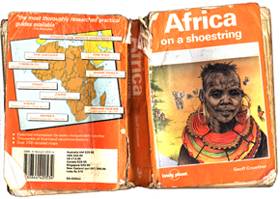 |
That evening we were persuaded (by Hussein) to take a tour of Kano with some people from an overland tour truck. In the end there was some confusion and instead we were taken to see the Dhurba which was a special festival to herald the end of Ramadan (and the restaurants opening again). The drive to the square was a minor adventure in its own right and gave us several clues to the road rules as interpreted by the locals. At one point the minibus driver got bored with the right hand side of the road, as it was blocked with traffic, and swapped onto the left side. He then proceeded to drive straight towards the oncoming traffic! Amazingly we arrived in one piece and as foreign tourists (albeit scruffy ones) we were led to best position at the front of the crowd.
| Celebrating Ramadan in Style |
|---|
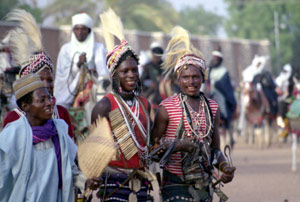 |
At the Dhurba representatives of each of the local tribes etc. parade and reaffirm their allegiance to the Emir. Everyone wore their best tribal costume and looked very spectacular. Some were throwing machetes in the air, others had small dead animals on sticks and a large group were charging around on horse back. They would start at one corner of the and charge to the other corner and any spectators in their way had to move fast. It was easy to see where the Nigerian driving style had evolved from.
That evening we went in search of a restaurant. Along the sides of the roads there were huge storm drains like the ones in Singapore. The drain crossings here looked a little more precarious than the ones in Singapore so we trod very carefully, thankful that this wasn't the rainy season. With no breeze to disturb it the hot, humid air had gained a physical presence. There was no doubt that we had reached the tropics. My meal was cassava ( Yam root ), something loosely defined as meat and some rather nice local beer. At the next table was a rather miserable looking ex-patriot sitting alone with his beer. He invited us over to join him. He was doing aerial surveys of Nigeria for some aid organisation or other and hating every minute of it. The image of the ex-pat lifestyle is one of high pay, little work and lots of time relaxing in tropical paradise with tall iced drinks. He painted a bleak picture of a lonely man, far from home, fighting a losing battle against broken air conditioning, defective or non existent equipment and worthless employees. The only thing in common with the Gin and Tonic lifestyle seemed to be the ridiculously high wages. He was so glad of chance to talk to someone that he even paid for our meal.
The next day Hussein asked us if we needed any spare parts for our vehicle. I laughed and pointed rather hopelessly at the broken windscreen. Before leaving the U.K. we had been warned 'don't smash your windscreen as they cost 500 GBP in Africa, if you can get one that is'. He wandered off and came back a short while later with a price. The price was 1500 Naires which turns out to be 88 Pounds! Not much different to the U.K. Price. It came in a plastic bag marked genuine Landrover Part (which they kept!) and even had the correct brand etched into it. My only gripe was that our old one had been tinted. If we'd waited long enough I am sure we could have got one. He also managed to organise some more 'insurance' for the countries not covered by our current documents. This insurance was extremely dubious in nature and I had no doubt at all that our 'premium' would not cover us in the event of an accident. With luck it would probably fool the average border guard, which was really what we needed it for. I feel certain that a cleverly formulated piece of paper with official looking letterhead, lots of countries listed and the words Insurance and Assurance in large letters would have served us just as well (except in the more sophisticated countries like Algeria or Zimbabwe for instance). Such a document would have been trivial to produce in a few minutes using the average desktop publisher and laser printer. Of course I would never suggest that anyone attempt home forgery and accept no responsibility for the consequences of such an action...
The campsite at Kano was well organised with showers and flush 'sit down' toilets. There was even running water. At least there was dribbling water for a few hours in the morning and a few in the evening. This meant that for most of the day you could not use the shower or flush the toilet (assuming that you had chosen one that worked). We tried to use the toilet only when the water was running. However our bowel functions had not yet recovered from the water we had drunk on the Algerian ferry and it was difficult to be that controlled. By mid morning a trip to the toilet revealed that we were not the only ones in this situation. We never managed to use the shower as people staying in the 'rooms' were always forewarned and got there first. Instead we rigged up our 'solar shower' (a large plastic bag with a shower nozzle) and constructed a makeshift shower curtain using a groundsheet and the open truck door. All the while desperately hoping a gust of wind didn't blow away the sheet or slam the door shut.
The next day we head off towards the Yankari Game reserve and our first chance to see wild animals. As we turn along the road to the game reserve I noticed some funny black ring marks in the road. The significance of these markings was lost on us for the moment.
Yankari Game reserve was our first taste of an African Game park. Our vision of a game park was of buildings with cool shady verandas where we would sit, sipping cocktails as we watch the sun set over the plain. The distant trumpeting of the elephant, the roar of the lion... Twenty years ago it might have fulfilled our expectations but now Yankari is a little run down, a shadow of its former self. The campsite was really the car park. There were no separate toilet facilities, only the public ones. It was now becoming obvious that toilet maintenance is rapidly becoming a lost tradition in Africa. There was a bar, with a veranda, but no shade. There was a view over some bush, but no animals in sight (apart from the ubiquitous baboons) and the seats were made of faded plastic. There were some individual 'luxury' huts, these were dark and cool with working air conditioning. We met an American student who was staying in one of these and she was quite comfortable.
The locals were friendly and the beer was cold. Wild baboons wandered around the campsite freely, looking for food left by careless tourists. The baboon is a large animal, an adult male being about the same size as a person but more stocky and with very large pointy teeth. They inhabit the ecological niche so recently vacated by we humans and show all the features one would expect from a creature living as our ancestors did. They are cunning, intelligent, fearless and will eat anything. They can open car doors (if not completely closed), fridges and trailers. They will happily take food from the table in front of you if you're not careful. Having animals wander around the campsite does however add a more natural feel to the game park experience.
| Yankari Safari |
|---|
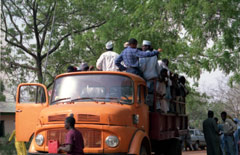 |
Another highlight of Yankari is the thermal pool with soothing warm waters, surrounded by tropical birds and trees. Behind the pool is a wall decorated with animals. Rhino, lion, baboon, tiger... hang on there is something wrong here.
| Fearless Baboons |
|---|
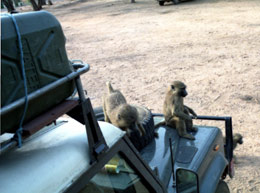 |
Some deep primeval urge was called from dark depths within me. I lunged up the hill in pursuit. Clad only in dayglo orange swimming trunks, modern man barefoot against the pretender to his niche. A primordial struggle ensued. Ignoring the pain of sharp thorns whipping against my legs I chased the baboons deep into their territory. But hey this was our jungle once. Another ancient racial memory surfaced, I picked up a bone fragment and a rock, hefting it in my hand, it felt good, solid. I threw it at the big male baboon, which just moved away. By this time my mate, I mean Fiona, was at the top of the hill (having sensibly taken the steps) and throwing stones down at the baboon. Eventually, after scoring a couple of very near misses, the baboon dropped the sunglasses and loped away. I would like to say this was in fear of the superiority of the humans, but I think it was bored with the game! I got my sunglasses back, With an enormous scratch across the lenses and tooth marks on the frames. Neither I, nor the baboon, would ever wear them again.
A hollow victory, but necessary to restore the primeval status quo. The baboons are getting a bit too confident. It won't be long before they start going round the corner and selling the stolen goods back to other tourists! Remember where you heard it first.
We decided to go on the evening game viewing trip with the American girl. While we were waiting I checked over the truck. Whenever we stopped for more than half a day I would find myself checking, tightening and generally pretending I knew what I was doing. By the end of the trip some of the pretence had gone. This time I could smell diesel and noticed the fuel tank seams were damp. I had a tin of fibreglass body filler and started to mix some up. I had mixed two part fibre glass resin many times before in England. In 40 degree heat it went solid almost instantly, before I could get any of it in the seam. I tried again using an incredibly small amount of hardener and just about managed to finish before it was solid this time. This repair held for over a year and got us out of Africa before the tank, its inner skin riddled with rust holes, finally collapsed pouring diesel all over our garden.
It was a public holiday in Nigeria celebrating the end of Ramadan and lots of locals arrived for the evening game drive. The men forced themselves onto the first truck, casting aside the women and children. The overloaded truck drove off with the passengers pointing, shouting and generally scaring all the game they were supposed to be looking at. A second truck was produced, which we got onto along with the women and children. All the game was well and truly scared away by that time. The second truck had been found in a hurry and no one had thought to look at the fuel gauge. Half way around the game drive the truck ran out of diesel. We had to wait for about an hour by a naturally carbonated mineral spring (Perrier roll over) which, with some trepidation, we drank from. It tasted OK! It was starting to get dark and ominous carnivorous animal noises began filling the evening air. By the time some spare diesel had arrived it was almost fully dark and most animals which weren't currently searching for stranded tourists to eat were asleep somewhere in the bush. Altogether a different evenings game viewing to what we had expected.
For breakfast we bought some fresh local pineapple from a local fruitseller. This was the most wonderful tasting pineapple I had ever tasted, fresh and crisp and juicy. We also bought some watermelon and cut through the outer shell to reveal pink juicy flesh. After placing it on the table we sat for a moment and contemplated the delights of such tropical fruits. Before we had a chance to take a single bite of perhaps the nicest watermelon in Africa a baboon sneaked up from behind us and stole it. The baboon sat, just out of stones reach, spitting watermelon pips at us and my opinion of these animals reached an all time low.
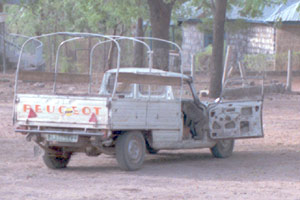 |
| This baboon opened the car door and was looking for food. In a few years time we expect they will be stealing cars and going for joy rides. |
As we drove away from Yankari we pondered again on the dark ring markings on the road. They were about the size of truck tyres and looked almost like someone had... no surely not.
Whenever you stop in Africa it isn't long before a crowd of curious people surrounds you. This can be quite annoying, especially when you are settling down for the night. We would usually try and find a nice hidden spot to camp for the night. In this part of Nigeria the villages were too close together and there were no places out of site from prying eyes. We ended up camping for the night in the courtyard of a 'hotel' (we didn't like the look of the 'rooms') which didn't look like it had received guests since 1921. As we primed up the paraffin stove and prepared our evening meal the people who lived there sat around us and watched our every move with great enthusiasm. It was however marginally better than having the entire village watching us.
Our visas for Cameroun stated that we must enter the country within three months of obtaining the visa. The three months was up in two days time. This meant we had to leave Nigeria straight away, which was a shame as the local people were cheerful, friendly and always seemed to be busy doing something. The view was staggering with huge rounded granite boulders balanced precariously in tall piles as though by design. There were more species of brightly coloured lizards to spot and some amazing blue coloured hornbills which we never had a chance to see again or photograph.
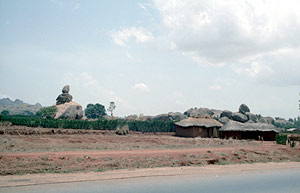 |
| Nigerian Village next to massive balancing boulders |
|---|
"Yes, but it is very bad, you should go round", they said.
We felt confident that a Landrover was up to the job and it looked perfectly adequate to us.
"This man he is going to the village, he can show you the way, or you will be lost".
"OK", we said and headed off with our pathfinder. The road had a lovely smooth surface with very few potholes, for about 5 km that is. Then it reverted to a narrow and bouncy dirt track. The road got steadily worse as we got closer to his village. The jungle on either side now tight against the edge of the road. We took several turnings and I think the man had decided to go to a different village while he had the opportunity. Eventually we dropped him off at the village he was going to. After giving him a lift all that distance we might have expected him to say thank you. Instead he said, "Give me one thing". "What! Just tell us the way to Ogoja", Fiona replied. "It is easy, just go very straight, very straight".
As I drove off it dawned on me that we were now a long way from the road without a guide. The road was very windy and would often branch into two roads with no indication as to which route to follow. The only thing to do was to ask everyone we saw if this was the way to Ogoja. They would always reply, "Yes, just go very straight". We were slowly beginning to learn about Africans. The African nature is a very cheerful and good natured one. They do not wish to disappoint you and so, if you ask if this is the way, the will always say "Yes" (just go very straight). If there were two equal possibilities they would wait to see which they thought you favoured before answering. "That road, just go very straight". By now we were well and truly lost when we came across a roadblock. There was a very well constructed and counterbalanced pole blocking the road. As a large group of men appeared from the dense jungle around us, we began to wonder if anyone would ever know what happened to us. They stared at us in utter disbelief, in all probability no tourist had ever been down this road before. Then they laughed, lifted the barrier and waved us through. As we drove through we asked once again if this was the road to Ogoja. They laughed again and said "Yes, just go very straight".
We were now very lost and beginning to get a little concerned. There were two African ladies walking along the road with baskets balanced precariously on their heads. "Which way is Ogoja?", we asked desperately. "That way, our village is near...". We offered them a lift. "Are the baskets heavy", I asked, paranoid as ever about overloading. A Landrover can carry a lot of weight, it does however have limits. We were at, or more probably beyond, those limits. The lady said "No, they are light". Perhaps she didn't want to disappoint me but more probably these were light load by her standards. I am no weight lifter but by now I was quite adept at throwing full 20 Kg Jerry cans around. I could barely lift the baskets into the back of the truck. When you see picture of an African woman carrying a load delicately on her head, make no mistake, it is a very heavy load.We dropped them off at their village and the main road was still nowhere in sight. "Just go very straight" they said and smiled. This time within 10 km we were at the main road. The road was worn out and full of holes a moon could be proud of. We were very glad to find it again. We never did find Ogoja.
The border between Nigeria and Cameroun was a bridge. As we arrived we were greeted with our first real tropical downpour. For a few minutes you could hardly see the other side of the bridge. The rain was warm and as soon as it stopped your clothes were already dry. The border formalities were becoming familiar, the passport, the visas, the vehicle search, the Carnet stamp, the worrying conversations with border guards in international sign language, the AK47s. We would usually go into the offices together, especially in the Francophone countries as I didn't have the faintest clue what was being said. This time Fiona was not allowed inside the office. Cameroun was technically bi-lingual, which meant there were two official languages, English and French. This was however no guarantee that a local could speak either of them. The fat official seemed to have difficulty with either language. We got to a really difficult question. "Occupation". Once again I tried the difficult international sign language for 'computer programmer'. After about five minutes of intense mime we made some headway. In a desperate attempt to save time I pointed to Fiona, and did the sign language for 'She's a programmer too'. The official looked at me and said, with a much greater grasp of English than he had previously alluded to. "She is your wife?". I thought it best to agree. "Then she is Housewife!". At this point he wrote down "Housewife". I decided a discussion of a century of women's suffrage was inappropriate at this time. From then on we were married and Fiona was no longer a computer professional. In time we also gained two fictional children who were with their grandparents. It was beyond the comprehension of many Africans that we were both obviously over seventeen and had no children. This little fiction made our lives much easier.
On the other side of the border the road became a narrow winding track closely bounded by dense impenetrable jungle on either side. The locals drove very fast around the blind bends without any thought for oncoming traffic. It was now getting dark (in these latitudes it would be fully dark by 19:00hrs) and there was absolutely nowhere to pull off the road. Stopping in the road would have been inviting some mad local driver to smash into us in the middle of the night. We had no choice but to continue along the road, now full of leaping frogs, eyes flashing in the headlights, until we reached Mamfe.
There is a special kind of darkness reserved for night time in an African town. Street lights are of course a thing of the past, or possibly the future. The glow of cooking fires or the dim light of a coveted electric bulb, grudgingly radiating through torn blinds, lend form to the town. According to 'Shoestring' there was a Hotel here. In the day we may have had an even chance, but at night we had no hope. Eventually the vague shape of a church formed in the darkness. We stopped and asked for directions. The priest's son took us to the nearest hotel and didn't ask for, nor expect, a gift. The rooms were clean and well maintained with a working shower and clean toilet with toilet paper supplied.
I had another well deserved beer and we talked to some locals in the bar. There were vague rumours of trouble in the South of the country. The Spanish robbers were probably listening eagerly to the BBC world service news and well informed about the situation ahead. We however, were only mildly concerned as we settled down to another humid nights sleep in the tropics.



